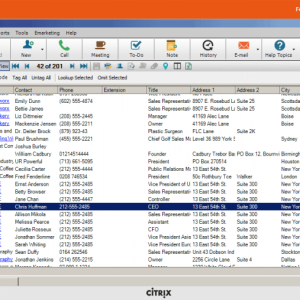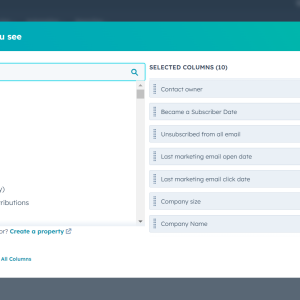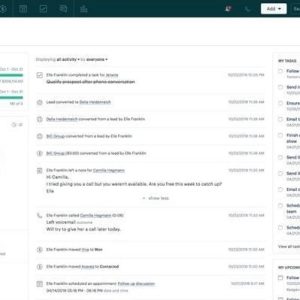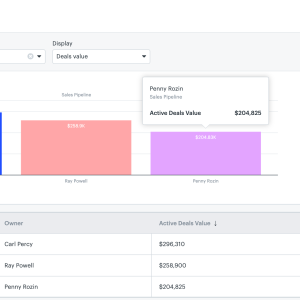Salesforce, the leading customer relationship management (CRM) platform, has been a popular choice for businesses of all sizes for many years. In this review, we will take a closer look at what makes Salesforce stand out in 2024 and why it continues to be a top choice for companies looking to streamline their sales, marketing, and customer service processes. From its user-friendly interface to its robust features and integrations, Salesforce offers a comprehensive solution for managing customer relationships and driving business growth. Let’s dive into what makes Salesforce the go-to CRM for businesses in 2024.
In our research and testing, we found Salesforce to be a solid — albeit slightly expensive — CRM option for businesses that need robust analytics, stellar customer support, and serious scalability. It was also a surprisingly easy-to-use CRM, with vast customizability available across the platform.
You are viewing: Salesforce Review 2024: What’s the Popular CRM Like to Use?
If you’ve never heard of Salesforce, you can’t have been looking for a CRM for long. Salesforce is an incredibly popular option in the industry, boasting a CRM market share of 24% and being used by more than 150,000 businesses across the world.
In our Salesforce review, we’ll take you through its most important features, pricing, and overall functionality as our testing reveals who the platform is best for in 2024. If you want to get started right away, you can also get a customized Salesforce quote in just a few quick steps.
Salesforce Review: Key Features
Salesforce didn’t score particularly high in our features research, largely due to the fact that it’s missing many of the lead capture and communication tools found in other platforms. These are key CRM software benefits for a lot of organizations, but Salesforce still has plenty of satisfied customers even without them.
Salesforce is quite robust when it comes to certain functionalities, allowing you to thoroughly track the progress of your sales team. There are some standout features that we found in our research to be particularly helpful when it comes to running a business.
Here are some of the key features available with Salesforce:
Custom dashboards
It’s hard to deny that this is one of the most valuable features from Salesforce. The CRM is largely known for its robust analytics tools, and the custom dashboards functionality is clearly the reason why. It’s easy to use, while providing a wealth of reporting options for your business.
You start with an empty page, and then you can add widgets that will create your custom dashboard. You have complete control of each widget, which allows you to choose the type of visualization you want, the metrics tracked in that visualization, and even the theme of the visualization. You can also easily add text or images to the dashboard by simply uploading them to the platform.
When you’re finished, you’re left with a pristine, professional looking dashboard that looks so good your design team will assume you’re getting outside help from a third party.
Even better, you can make unlimited dashboards with as many components as you can imagine and then organize them into folders and filters to make them easier to find.
All that to say, Salesforce should be your top choice when it comes to analytic tools, because the custom dashboard experience is as simple as it is expansive.
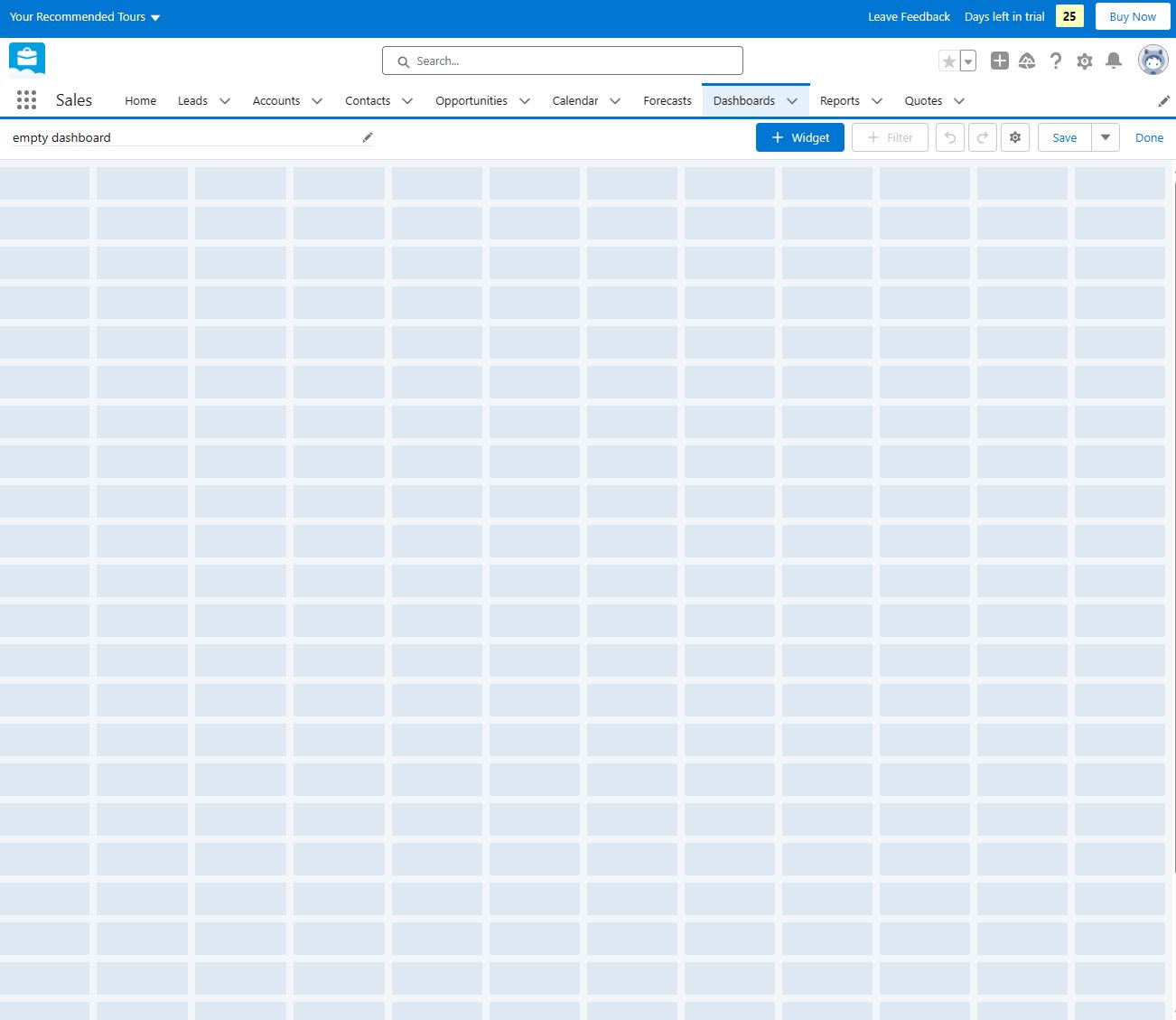







We were able to create sleek, professional dashboards with lots of customizability in just a few steps.
Source: Duanetoops testing
Guidance Center
Yes, our tests found Salesforce easier to use than expected, but that doesn’t mean you won’t need a little help getting your bearings. In fact, with a whole team using the platform, it’s safe to assume that someone is going to require some assistance when it comes to figuring out how to use it.
Fortunately, the Guidance Center on Salesforce makes it pretty easy. All you have to do is click the Guidance Center logo in the upper right-hand corner, and you’ll open a sidebar. This sidebar will be filled with helpful guides and articles that can help you use Salesforce more effectively, like “Define Your Pipeline” or “Set Up Accounts.” You’ll also find page specific guidance depending on which part of Salesforce you’re in, so you can get more granular with your support.
Additionally, for managers, Salesforce allows you to assign learning to other team members. Just scroll to the bottom of the Guidance Center sidebar and you’ll be able to access the Learning view, which allows you to create full-on learning paths for your employees to brush up on sales techniques and Salesforce functionality.




The Guidance Center sidebar made learning about the platform easy for us.
Source: Duanetoops testing
Lead management
Any good sales CRM should be able to effectively manage your leads. After all, it’s one of the essential duties of a sales team, so a platform that can’t handle that wouldn’t be very helpful to your team.
See more : Less Annoying CRM Review 2023 – Pros, Cons, Pricing & More
Luckily, Salesforce has a very comprehensive lead management system. You can create leads with just a few simple steps, manually adding information like contact details, lead status, and campaign history. Even better, when you complete the lead, it automatically adds relevant information into other categories, like Opportunities, Accounts, and Contacts.
Salesforce does lack in some areas compared to its competitors, though. It lacks meaningful lead capture features, like social listening and website chatbot available on HubSpot. You won’t get many lead communication features either, missing the website live chat and instant messaging apps, both provided by Freshsales.

Salesforce informs you where your lead information goes once it’s been completed.
Source: Duanetoops testing
Recent Records
With a robust software like Salesforce, it can be easy to get a little lost, particularly with the unlimited custom dashboards at your disposal. Fortunately, Salesforce provides “Recent” tabs across the majority of its pages, so you can easily check out exactly what you were looking at earlier in the day or even last week.
Even better, there is a dedicated page in the Salesforce interface that allows you to see all the most recent pages you’ve checked out — called Recent Records — so you don’t even have to remember which category you were using. There’s also a widget on the home page for Recent Records, so your most recently visited pages are easy to find right out of the gate.

Recent Records allows you to check out which pages you’ve checked out recently.
Source: Duanetoops testing
Vast customizability
We’ve already talked about custom dashboards, but Salesforce is very customizable beyond just the analytic tools offered in the platform.
The clearest example of this is the top navigation bar, the method for finding your way around Salesforce. By clicking the pencil icon to the right, you’ll be able to fully customize which categories are available to you and what order they appear in. It’s a small feature, admittedly, but it does show how customizable Salesforce can be for your team.
The frustrating aspect of the platform, however, is that the home page does not appear to be customizable, which seems like a lost opportunity. There could, however, be a way to do it in the lengthy setup setting, but we couldn’t find it.

We were able to customize the top navigation menu to fit our needs.
Source: Duanetoops testing
Salesforce Review: 2024 Test Results
We tested the Salesforce Sales Cloud free trial to get a better understanding of how the platform works. Whether you’re using Salesforce as a small business or an enterprise-level organization, we highly recommend trying out the platform with the free trial before making a financial commitment, particularly considering it’s pretty expensive and you’re required to sign a one-year contract to get started.






Salesforce was surprisingly easy to use for how much functionality is available in the platform.
Source: Duanetoops testing
Ease of use
In our testing, we found that Salesforce was quite easy to use, despite the vasty functionality built into the system. Features were clearly marked, with top banners and status bars found throughout the platform to provide a friendly visual aspect to more complicated aspects. That, combined with the customizability made Salesforce fairly simple to navigate, especially after a few minutes of just clicking around.
Features
Despite the ease of use, Salesforce still offers a lot of features and information for your sales team. Leads, opportunities, accounts, and contacts all have thorough, in-depth data sheets tracking everything, including interaction history, contact information, file documentation, and status indicators, so you know exactly what’s going on at all times.
Customer support
Salesforce also has very available customer support team, allowing users to reach them via email, phone, and live chat. It’s worth noting, however, that 24/7 phone support costs extra, unlike Keap, which provides it for all plans. That, combined with the robust Guidance Center feature for self-help options, netted Salesforce a perfect score in customer service in our research, so you know you’ll get the help you need if you have any trouble.
Salesforce Value for Money
Price is arguably one of the most important factors when considering a CRM platform for your business. All the features in the world won’t matter if you’re losing money on your investment, and that starts with the monthly cost per user that Salesforce charges for its service.
Below, we’ve included a pricing table for the Salesforce Sales Cloud, the platform we reviewed with the 30-day free trial, and the most popular version of Salesforce for everyday users. For more information, check out our Salesforce pricing guide to learn about all the other services provided by the platform.
We won’t mince words; Salesforce is kind of expensive, particularly when compared to competitors. The starting price of $25 per user, per month is well ahead of the industry average of around $15 per user, per month, and the subsequent plans don’t do much to assuage that concern. Heck, the most expensive plan is $500 per user, per month, so your sales team better by closing deals left and right before you commit to that much of an expense. Here’s a quick breakdown of the other plans:
- Essentials: $25 per user, per month
- Professional: $80 per user, per month
- Enterprise: $165 per user, per month
- Unlimited: $330 per user, per month
- Unlimited+: $500 per user, per month
You do get a lot for the cost, though. For customizability and help and support, few CRM are better than Salesforce, and the analytics tools are unmatched in the industry. It is a bit weak on features for the price, according to our research, but if you need a customizable tool that can tackle a whole lot of reporting, Salesforce is still a solid deal.
It’s also worth noting that Salesforce does not offer a free plan, unlike HubSpot. There is a 30-day free trial, though, which should be more than enough time for you to get a feel for the platform before you make a financial commitment. Salesforce does require you to sign a minimum one-year contract, though, so you better be sure before you input your payment information.
Who Is Salesforce Best For?
See more : Best Zendesk Alternatives
Salesforce is best for financial services businesses that may require a lot of reporting, and other large organizations that require scalability and customizability to manage their enterprise-level workflows.
Based on our testing, Salesforce is also one of the best CRMs for sales teams. This is largely down to its analytics capabilities. If your sales team is in need of a robust reporting tool that enables you to develop custom reports and in-depth dashboard, Salesforce if your best bet. As we mentioned above, the custom dashboards feature is a comprehensive system that provides users with all the analytics you could possibly need and then some.
That’s not the only reason you might want to use Salesforce, though. Our research found that Salesforce is also one of the top CRMs when it comes to providing users with customer support. The availability of representatives is substantial, allowing users to contact them via phone, email, and live chat, and the Guidance Center provides a vast selection of self-service support options. As a result, Salesforce is also best for beginners that might need guidance with a new CRM.
Finally, if your business is looking to scale in the future, Salesforce is a no brainer. While the more advanced pricing plans are expensive, they are also expansive, offering plenty of team infrastructure features like calendars, unified inboxes, and team communication tools. Its complexity means it’s not the best CRM for small businesses, but larger businesses should feel confident of being able to grow with Salesforce.

Salesforce provides a lot of information for users, like on this Contact page.
Source: Duanetoops testing
We take our impartial research and analysis seriously, so you can have complete confidence that we’re giving you the clearest, most useful recommendations.
After conducting an initial exploration to identify the most relevant, popular, and established tools in the market, we put them through their paces with hands-on testing to see their real strengths and weaknesses. In this case, we put 13 CRM systems to the test across 84 areas of investigation.
Based on years of market and user needs research, we’ve established a CRM testing methodology that scores each product in six main categories of investigation and 13 subcategories; this covers everything from the available features and scalability capacity to the product’s value for money, and much more.
Our main testing categories for CRM systems are:
Features: the functionalities and capabilities provided by the CRM software, such as contact management, lead and opportunity tracking, and task and activity management.
Help and Support: the resources and assistance available to users when they encounter issues or require guidance while using the CRM software.
Customisation: the ability to tailor the CRM software to suit the specific needs and processes of the organization, e.g. customizing fields, layouts, and workflows.
Scalability: the ability of the CRM software to accommodate the growth and changing needs of the organization, such as the capacity to handle a growing customer database.
Price: the cost associated with using the CRM software. It includes factors such as licensing fees, subscription plans, and additional charges for add-on modules or features.
Team Structure – Sales CRM: determining if a platform makes it easier to manage large sales teams, including team dashboards, team hierarchies, and team inboxes.
Usability – Small Business CRM: assessing the simplicity of the interface, the ease of navigating through menus and options, and the overall user experience.
When it comes to calculating a product’s final score, not all testing areas are weighted evenly, as we know some aspects matter more to our readers than others, which are merely “nice to have.” After hundreds of hours, our process is complete, and the results should ensure you can find the best solution for your needs.
At Duanetoops, we have a number of full time in-house researchers, who re-run this testing process regularly, to ensure our results remain reflective of the present day
Learn more about our research.
If you click on, sign up to a service through, or make a purchase through the links on our site, or use our quotes tool to receive custom pricing for your business needs, we may earn a referral fee from the supplier(s) of the technology you’re interested in. This helps Duanetoops to provide free information and reviews, and carries no additional cost to you. Most importantly, it doesn’t affect our editorial impartiality. Ratings and rankings on Duanetoops cannot be bought. Our reviews are based on objective research analysis. Rare exceptions to this will be marked clearly as a ‘sponsored’ table column, or explained by a full advertising disclosure on the page, in place of this one. Click to return to top of page
That’s a wrap on “ Salesforce Review 2024: What’s the Popular CRM Like to Use? ” We hope you’ve found a trove of useful insights and fresh perspectives. Your opinions and ideas matter to us—join the conversation below and share your take! Hungry for more tech insights? Dive into our diverse collection of articles where innovation meets practicality. Discover More CRM Softwares.
Stay in the loop with the latest in AI and tech – your journey into the digital future continues at duanetoops.com.
#Salesforce #Review #Whats #Popular #CRM
Source: https://duanetoops.com
Category: CRM
